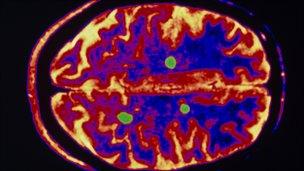Study offers hope of 'repairing' MS damage
- Published

The study suggests a way of helping the brain repair damage
Scientists have identified a way of prompting nerve system repair in multiple sclerosis (MS).
Studies on rats by Cambridge and Edinburgh University researchers identified how to help stem cells in the brain regenerate myelin sheath, needed to protect nerve fibres.
MS charities said the "exciting" Nature Neuroscience work offered hope of restoring physical functions.
But they cautioned it would be some years before treatments were developed.
MS is caused by a defect in the body's immune system, which turns in on itself, and attacks the fatty myelin sheath.
It is thought to affect around 100,000 people in the UK.
Around 85% have the relapsing/remitting form of the condition, in which "flare-ups" which cause disability, are followed by a recovery of a level of the lost physical function.
In this form of MS, there does appear to be some natural myelin repair.
However, around 10% of people are diagnosed with a progressive form of MS, where the decline continues without any periods of remission.
In addition, people with the relapsing/remitting form do often go on to develop what is called secondary progressive MS, which affects them in the same way.
'Missing link'
Scientists have been looking at how they might develop treatments for these two groups.
In MS, loss of the myelin sheaths which act as insulating layers, leads to the nerve fibres in the brain becoming damaged.
These fibres are important as they send messages to other parts of the body.
This study identified a signalling pathway in the brain which can encourage the brain's own stem cells to regenerate new myelin.
The scientists believe this will help in identifying drugs to encourage myelin repair in MS patients.
However, much more work is needed - both to test if the mechanism works in people with MS and to see what drugs might be needed to promote the effect.
Professor Charles ffrench-Constant, of the University of Edinburgh's MS Society Centre for MS Research, said: "The aim of our research is to slow the progression of MS with the eventual aim of stopping and reversing it.
"This discovery is very exciting as it could potentially pave the way to find drugs that could help repair damage caused to the important layers that protect nerve cells in the brain."
Professor Robin Franklin, director of the MS Society's Centre for Myelin Repair at the University of Cambridge, said: "Therapies that repair damage are the missing link in treating MS.
"In this study we have identified a means by which the brain's own stem cells can be encouraged to undertake this repair, opening up the possibility of a new regenerative medicine for this devastating disease."
The study was funded by the MS Society and the National MS Society in the US.
Simon Gillespie, chief executive of the MS Society, which part-funded the research, said: "For people with MS this is one of the most exciting developments in recent years.
"It's hard to put into words how revolutionary this discovery could be and how critical it is to continue research into MS."
Pam Macfarlane, chief executive of the MS Trust added: "Exploration of processes that might repair areas of damage to myelin, is another important area of MS research and this may eventually allow people to recover function that has been lost to disability.
"This is still an early study in rodents but it will be very interesting to see how it develops."